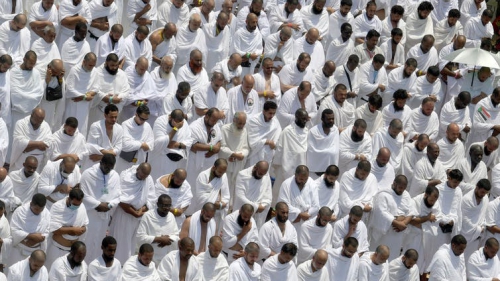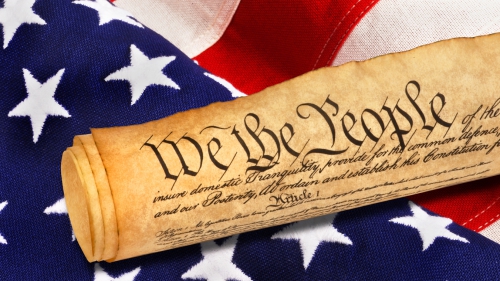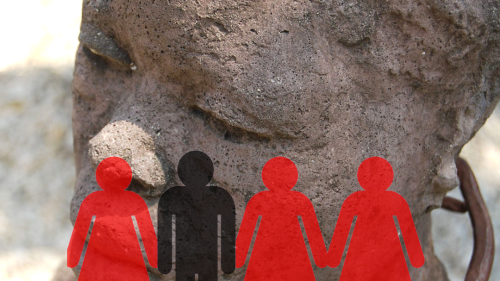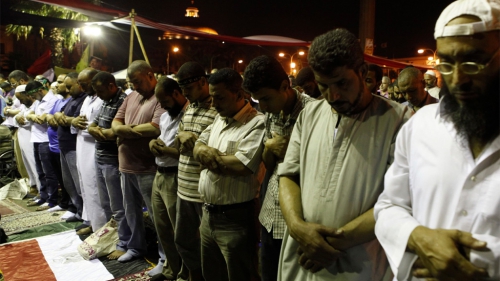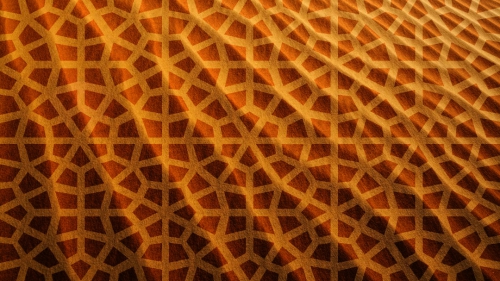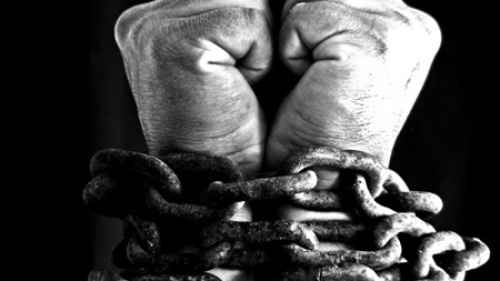Islamic approach against slavery
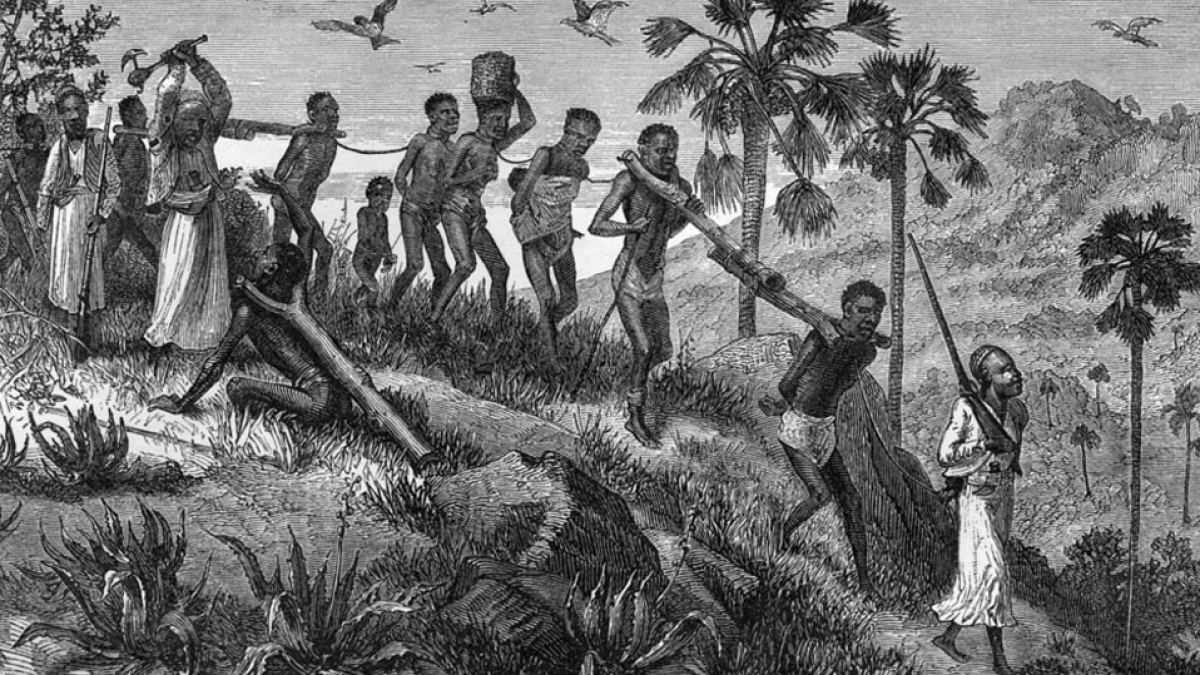
Many people question Islam's nature due to their perceived ideas and knowledge about the religion's outlook on the subject of slavery. Many ask, if Islam were suited to every period of human history, it would not, as it did, approve of slavery, which proves conclusively that Islam was but meant for a limited period of history only. It has fulfilled its mission and now stands outmoded and obsolete, for it was not designed to be a religion for all times and climes.
Many sincere Muslims are haunted by similar doubts. Why did Islam permit slavery? This religion is no doubt revealed by God; there can be no doubt about that, and that it was revealed for the good of the whole of mankind for all times to come, but how is it that it allowed slavery? How did the religion based on the notion of perfect equality among men, stressing the common origin of them all and then successfully translating its concept of equality it in its social life recognize slavery as a part of its social system and as such made laws for it? Does God intend that human beings should forever remain divided as masters and slaves? Does He want that the human race should continue to have a group of people among them that is sold and bought as chattel as was the case with the slaves, when He Himself said of human beings: "And surely we have dignified the children of Adam," and if God did not intend or like that, why did He not then explicitly forbid it in His Book and abolish it outright as He did for instance, abolish drinking, gambling, and usury, etc., the practices which He abhorred? In short, Muslims know that Islam is a true religion but like Abraham, they are perplexed and seem to be in a state of mind described in the Quranic verse:
"And when Abraham said, My Lord, show me how You give life to the dead, He said: What! And do you not believe? He said: Yes, but that my heart may be at ease." - The Holy Quran (2:260)
When a modern man looks at the problem of slavery with his twentieth century background and in the light of the hideous crimes perpetrated during the slave trade and the abominably barbarous treatment that was meted out to slaves (especially in the Roman Empire) he discovers it as a most shocking and horrid crime. He is at a loss and finds it extremely difficult to understand as to how such a thing could be approved of by a religion or a system of life. He wonders: how could Islam allow slavery when all its other laws and principles point out towards the freedom of man from all types and forms of slavery! And overwhelmed by a sense of shame he desires: would that Islam had set our hearts and minds at ease by banning slavery in clear, explicit terms!
Islam's advent heralded the restoration of human dignity to slaves. It told the masters as to their slaves: "You are (sprung) the one from the other."1 The Prophet Muhammad said that: "He who kills his slave, we shall kill him; who mutilates his nose, we shall cut his nose; and who gelds our slave, we shall get him gelded in return."2 Islam recognized a common descent, abode as well as return for all men, master and slave alike saying: "you are all sons of Adam and Adam was created from dust,"3 and stressed that there was no superiority for a master: whatever his superiority there was, it rested on piety: "There is no superiority for an Arab, nor for a black man over a red one, nor for a red one over a black man save due to piety."4
Islam came and ordered the masters that they should be fair and good in their dealings with the slaves: "And be good to the parents and to the next of kin and the orphans and the needy and the neighbor of (your kin) and the alien neighbor and the companion in a journey and the wayfarer and those whom your right hand possesses; surely God does not love him who is proud, boastful."5 It stressed the fact that the true relationship between the master and his slave was not one of slavery and overlordship, nor of subjection or objection but that of kinship and brotherhood. Thus the masters were permitted to marry the slave-girls they had in their possession: "... Let them marry from the believing maids whom your right hands possess. God knoweth best (concerning) your faith. Ye (proceed) one from another; so wed them by permission of their folk, and give unto them their portions in kindness."6
Thus the masters were described as brothers to their slaves: "Your slaves are your brothers... so he who has a brother under him should feed him and clothe him as he himself feeds and dresses; do not ask them do thing which are beyond their power and if you do ask them to do such things then help them."7
With a mark of deference to the feelings of the slaves, the Holy Prophet added: "None of you should say: this is my slave and this is my slave-girl; he should rather say: This is my man and this is my maiden."8 It was on this authority that Abu Huraira on seeing a man riding a horse and his slave trudging along after him, said to the man: "Get him seated on the horse behind you, for, surely he is your brother, and his soul is similar to yours."
This was, however, not all that Islam did for the slaves, but before proceeding with our inquiry, we would first like to sum up the great advance that thanks to Islam came about in the position of the slave at this preliminary stage.
The slave was no longer regarded as just a commodity - a merchandize - but was looked upon as a human being with a soul similar to that of his master, whereas in the past he was regarded as a being, quite different from his master and created to serve as a slave in every way fir to suffer humiliation. It was because of this notion that their consciences never twinged them when murdering, punishing, cauterizing or making their slaves perform loathsome and burdensome jobs. Islam raised them from this state of abject slavery to the exalted status of brotherhood with free men. These achievements of Islam were not mere professions but a fact to which history bears witness. Even the prejudiced writers of Europe too admit that in the early period of Islam the slave was exalted to such a noble state of humanity as never before was witnessed in any other part of the world. They won so dignified a status within the Muslim community as made the freed slaves abhor betraying their erstwhile masters although now they stood in no need or fear of them and were now as free as they. The reason for this lay in the fact that they considered themselves to be members of the family of their previous masters and linked to them with ties akin to those of blood.
Also the slave now came to be regarded as a human being whose personal safety was guaranteed by law not permitting the commission of any transgression against him through word or act. As to the word, the Prophet forbade the Muslims to talk of their slaves as such and instead commanded them to address them in a manner that should make them think of themselves as members of their family, and blot out from their persons the stigma of slavery. With this in view he said: "Surely God has made you their masters; and if He had willed He would have likewise given you in their possession as slaves."9 This means that it was the particular conditions and circumstances that had made them slaves, otherwise they were as good as their masters. In this way Islam deflated a little the swollen pride of the masters along with raising the status of slaves so as to connect them all in a purely human relationship. It brought them closer and fostered love among them telling them that love and nothing else should form the basis of all their mutual relationships. In the case of physical harm or injury for both of them a kindred punishment was explicitly laid down. "He who slays his slave we shall put him to death," is a principle very clear in its vast implications, all of which go to show that a state of perfect equality prevailed between the slave and his master as between one man and another, besides guaranteeing to both of them the right to live as human beings. Thus Islam made it clear that the present situation - slavery - did not preclude them from their rights as human beings. These guarantees not only were quite sufficient to grant a slave his safety and security of life but they were so generous and noble that no other parallel in the whole history of slave laws exists at all either before or after the advent of Islam. In this respect Islam went to such an extent that it forbade the master to even slap his slave, except for purposes of correction (which has its won prescribed limits that may neither be passed by nor overlooked under any circumstances, the punishment given being however, similar to the punishment the master may award his own children on their mischief). This also provided a legal justification for setting the slaves at liberty. And with this we pass on to the next stage - the stage of actual enfranchisement.
The Holy Prophet used to free a slave who would teach reading and writing to ten Muslims or render any other kindred service to the Muslim community. The Quran enjoined that atonement for some of the sins consisted in freeing of slaves as also the Holy Prophet encouraged it for the reparation of any other sin one might commit. This contributed more than anything to bring liberty to the greatest number of slaves, for, no man could hope to be wholly free from sin as the Holy Prophet said: "All sons of Adam are sinners." It may be well to point out here one of the atonements prescribed by Islam for sins, as it in particular illustrates the standpoint of Islam with regard to slavery. Islam prescribed that redemption for the killing of a believer by mistake was the freeing of a believing slave and paying blood money to his people: "And whoever kills a believer by mistake, he should free a believing slave, and blood money should be paid to his people."10 The murdered man killed by mistake, was a human being of whose services his people as well as the community was deprived without any legal justification, for which reason Islam prescribed that a compensation should be made to both parties, his people and the society: his people getting a just blood money and the society another man to serve it in his place, the newly-freed believing slave. Thus the freeing of a slave meant bringing back to life a human being as a compensation for the one who was lost due to his being killed by mistake. As is clear from this, Islam views slavery as death or a state very much similar to it notwithstanding all those securities that it did provide for a slave. That is why it eagerly snatched at every opportunity to resuscitate this wretched class of human beings by restoring them to their liberty.
Islam never approved of slavery in principle as it strove hard with all the different means at its disposal, to eliminate slavery once and for all. It tolerated its existence for the time being just because it had no other alternative, for it concerned not only Muslims but those people as well who were not under its direct control. They held the Muslims in servitude making them suffer the worst possible forms of humiliation and miseries which drove the Muslims to adopt with respect to these people a course of like-treatment, at least in treating their prisoners of war as slaves though not in their actual transactions with these slaves afterwards.
Islam could not effect the abolition of slavery so long as the world did not agree to put an end to the only source of slavery - enslavement of prisoners of war. So when that concord was achieved, Islam welcomed it as it formed the unalterable fundamental principle of its polity: liberty for all, equality for all.
Notes:
- The Holy Quran (4:25)
- Al-Hadith, narrated by both Bukhari & Muslim besides Abu Daud, Tirmidhi and Nisai.
- Al-Hadith. Muslim & Abu Daud.
- Al-Hadith. Bukhari.
- The Holy Quran (4:36).
- The Holy Quran (4:25).
- Al-Hadith.
- Al-Hadith. Narrated by Abu Huraira.
- For reference, please see Ghazali's Ihya-Uloom-I-Din, chapter on Rights of Slaves.
- The Holy Quran (4:92).
This article is an excerpt from "Islam the Misunderstood Religion" by Muhammad Qutb.
Related Suggestions
The scholars should be able to proclaim this based on what the Quran says about slavery as well as the prophet's(pbuh) actions. That is what the scholars are for to give a decision when there is a complex issue at hand.
We must look at all the Chapters in The Quran, look at Islam intotality My Dear Brothers and Sisters, for Islam did not just began during the time of Prophet Muhammad ( peace be upon him ) but ever since the creations of Adam and Eve (a.s). In Chapter of Al-Baqarah, the longest surah mentioned that GOD will create a human being to be HIS vicegerent on earth.
Adam and Eve are Muslims, Adam ( a.s ) is a Prophet too, he is not just a first human. So do Luth, Hud, Jaacob, Zachary, Noah, Moses and Jesus and others ( peace be upon them all ). If in the time of Moses, it was described on the evils of slavery, then slavery is also prohibited not just during Moses but through all ages. If the events of Sodom and Gomorah happened during Prophet Luth ( a.s ) then it must be taken that gayism and lesbianism are prohibited as one of the major sins.
Islam is only perfected during the times of Prophet Muhammad ( s.a.w ) but all injunctions including the ones which were sent to the previous Prophet ( s.a.w ) remains in effect. And as regards to the so-called " underground slavery " in saudi Arabia, please check and verified before accepting those claims. if it is true, then it is still wrong, because after slavery gradually diminished during the times of Prophet Muhammad ( s.a.w ) there is no way that a Muslim can take slaves.
Why was slavery not immediately prohibited ? It may be because the slaves themselves would require time to assimilate into societies, for they would be lacking in skills except manual labour. They might not have homes to stay for instance. But freeing them gradually are the transitions needed.
Let me ask all of my Brothers here. During the advent of Islam, i.e after the whole Arabia accepted Islam, were there any slaves market anymore ? None. And on prisoners of war, Islam approach was the most humane. They were well treated. Read again the author point on the last paragraph. I'll write more on this later
However the article is a good one, and explains clearly the difference between the way slavery was practiced under Islam, but does not explain fully enough how those practices were re-transmitted back to the European powers. And of course that incomplete transmission of the institution undoubtedly explains how Western slavery came to be so cruel. Still, an interesting and informative article.
A well written article on Al - Islam stand on slavery issue, however it's not crystal clear to me so far! Just for the seek of discussion can someone tell me why "silence slavery" or "underground slavery" is still being practice or permitted in Saudi Arabia and in many of the Arabic countries and yet that is the home of Al-Islam? I say this because I know a few people who work in those countries and the way they say they are being treated...one can not believe and yet they are all Muslims. Ramadhan Mubarak to all.
Ramadan Mubarak
I would like to correct something that I've been hearing that I think the majority of Muslims do not understand. Al-Islam has never tolerated slavery(raqab). The Qur'an says that Allah doesn't change his sunnah(way). Allah has the same sunnah(way) even since ancient times. So, if slavery(raqab) was illegal and wrong and punished by Allah because of the transgression of Pharoah then the same applies during the life of Prophet Muhammad. Remember, Allah doesn't change his sunnah(way). AL-Islam never sanctioned slavery(raqab), now some muslims and non muslims may have continued to have slaves(raqab) but that's their great sin. The great sin of some people during the life of Prophet is not The religion of Al-Islam. Please do not confuse the two. The problem is that we are loosely using the term slavery. There are different arabic terms behind the word slavery found in the Qur'an. Slavery is sometimes translated from raqab(brutal treatment of a person, abd(servant), or ma malakat aymanahum(those captured in war). The loose use of the term is confusing even to those who supposed to be knowlegeable. Slavery was abolished at the beginning of creation not during the life of Prophet Muhammad. Allah says in the Qur'an that he has shown you the two highways and don't make haste on the path that is steep. And, what will explain to you the path that is steep freeing the slave(raqab). So, we need to stop saying slavery was abolished over time in Al-Islam. Slavery was allowed by Allah, but the perpatraters will fill hell up along with pharoah. Those captured in war lives were upgraded from armies that would slaughter everyone in sight. As muslims we need to come to a better understanding of this issue. Remember, Prophet Muhammad brought no new religion. When Prophet Muhammad made the people aware of the Qur'an THE PEOPLE began to change over time Not Al-Islam. It's the same religion of Truth and Justice since the creation of Adam.
Slavery is evil but let me help to reply to Daud Azizi on why is it that Islam do not abolish slavery outright while it took a clear stance on alcohol. Let me reply it this way, the manner of studying the Quran and the Quranic injunctions is known as " Asbab -ul - Nuzul " or the reasons why certains verses of the Quran was sent.
Alcohol was not prohibited over night, it took a span of time. Firstly the Quranic verses was not on direct prohibition but instead to the following effect : " O those who believe, Do not draw to prayer when ye are drunk, ( I'll provide the exact verse later ) The second injunction is this " Alcohol have it's merits and demerits. But the demerits are more outweigh than the goodness . ( merits ) And the final verses is " Alcohol ( intoxicating ) and game of chances ( gambling ) are the work of evil. Shun them, may ye succeed...."
Because now I am travelling between cities I am unable to research my Quran for the names of the chapters but I'm confident of it's " asbab -ul - nuzul".
On slavery, if one were to look carefully into the spirit of the Quran, the gradual prohibitions imposed by putting difficult conditions will actually makes one conclude that " THERE IS NO SUCH SLAVERY IN ISLAM. Well, if a bondsman is entitled to eat the same quality of food, clothes, treatment and standards of living and have almost the same rights as the so-called master, then actually he cannot be called a slave anymore as no slave would get such a luxurious treatment. Remember Daud Azizi, when America practised and finally abolished slavery, still former slaves found it very difficult to fit in racism of the American South. The stigma that they were just half equals to the previous white masters and at the same time they were not given the rights like all Americans.
But not Islam and the story of Bilal Ra 'bah is evidence of this. I'll write more later . HAPPY RAMADHAN TO ALL
I hope islamicity will come with better article . This article really do not answer what non-muslim have in mind.
Salaams.







